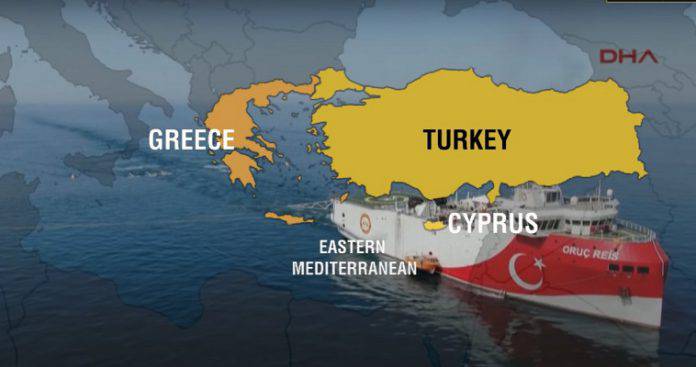Labros Tzoumis: They moved the red line to six miles leaving out sovereign rights in the EEZ
28/10/2020
The Turkish research vessel Oruc Reis has been conducting research on the Greek continental shelf for three months now, reaching nine nautical miles from Kastellorizo, without a dynamic response from the Greek side, because the six-mile territorial waters were defined as a red line. Initially, the opinion was expressed that it does not or cannot carry out research, due to the noise of the adjacent accompanying vessels.
This view was refuted by the former National Security Advisor Mr. Diakopoulos, who “resigned” from his position. The Turks bombard us daily with images from the research vessel and claim that they are conducting research inside the Turkish continental shelf. In order for the issue to be communicated by the government and the opposition for petty political exploitation, the boundaries of Turkish provocation and illegality are shifting daily.
From a governmental point of view, we have heard statements that “the red line is national sovereignty, and when we say national sovereignty we mean national territorial waters, which today are defined as six nautical miles.” The area of territorial waters is a continuation of the national territory in terms of the degree of sovereignty, ie it is no different from the land.
Dominance is a red line. But what about sovereign rights?
Dominance extends to the airspace above the territorial sea as well as to its seabed and seabed. Criticism of the opposition focused on the fact that through government statements Greece is depriving itself of the right to extend territorial waters to 12 miles, which is known to be a unilateral sovereign right. But Turkey has been threatening us with war since 1995 if it is exercised.
That is, the criticism focused on the extent of territorial waters and not on the fact that Turkey conducts exploration within the Greek continental shelf, violating national sovereign rights (ie exploration and exploitation of natural resources on the seabed and subsoil). On the issue of the continental shelf to point out that, according to the official position on the website of the Greek Ministry of Foreign Affairs:
“The Convention on the Law of the Sea provides for the sovereign rights of the coastal State over the continental shelf, the width of which is at least 200 nm, if the distance between the objective coast allows it. These rights of the coastal state exist automatically and a priori. All the islands are entitled to a coastal zone, a border zone, an EEZ, and a continental shelf.”
Differences on the continental shelf
The divergence of positions between Greece and Turkey on the issue of the continental shelf has not allowed to date its delimitation in the Aegean and the southeastern Mediterranean. Greece argues that the continental shelf should be demarcated in accordance with international law and the principle of the midline, while Turkey argues that the Aegean islands do not have the right to a continental shelf because the proximity of the Greek islands to the Turkish coast is a “special circumstance” justifying differentiation from the principle of the middle line.
Despite the fact that the continental shelf has not been demarcated due to the above different position, over time Greece’s position has been that any action by Turkey for research within the limits of the potential Greek continental shelf is a challenge to Greek sovereignty. This was shown by the crises of 1976 and 1987 when Turkey attempted to conduct research in the Aegean and the two countries were on the verge of armed conflict.
From the current confrontation of the research vessel Oruc Reis and the recent positions of both the government and the opposition, it seems that the violation by Turkey of an area within the Greek continental shelf that meant for decades a military reaction on our part has shifted to the areaf of territorial waters to six miles or 12 miles, if we ever extend our territorial waters.





